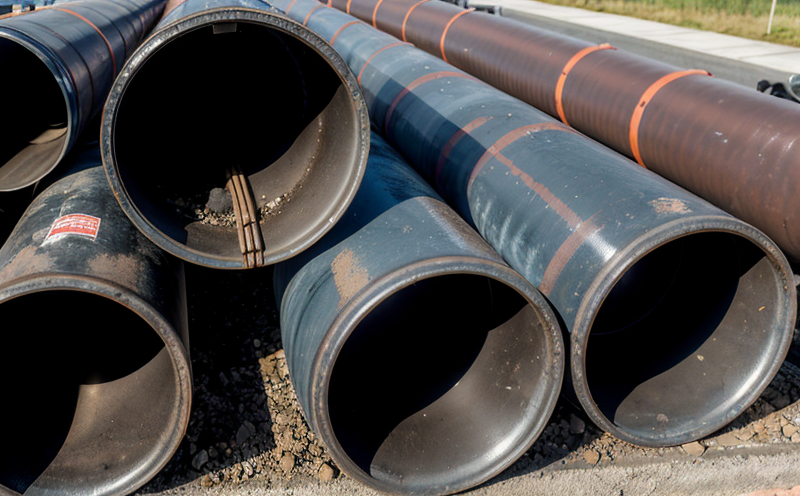IEC 60794 Mechanical Testing of Plastic Conduit Tubes
The International Electrotechnical Commission (IEC) standard IEC 60794 is a set of specifications that cover the mechanical performance requirements for plastic conduit tubes used in electrical installations. These tubes are critical components ensuring the safe and reliable transmission of electrical signals or power, especially within industrial, commercial, and residential settings.
Plastic conduit tubes must meet stringent mechanical testing standards to ensure they can withstand various stresses and strains over their lifecycle. This includes resistance against bending, tensile strength, impact resistance, and flexibility tests. These tests are crucial for ensuring that the conduits perform reliably under typical installation conditions as well as in exceptional circumstances.
The process begins with careful preparation of specimens. Typically, these tubes need to be cut from larger rolls or coils into standardized lengths and diameters suitable for testing. The samples must then undergo cleaning procedures to remove any surface contaminants which could affect the accuracy of mechanical tests.
Once prepared, the tests begin with a visual inspection followed by precise measurements using calibrated instruments. The bending test assesses how well the tube maintains its shape under specified load conditions; this helps determine if it will remain intact during installation and use. Tensile strength testing measures the amount of force required to break the sample when stretched beyond its elastic limit, providing insights into the material's durability.
Impact resistance tests simulate real-world impacts that could occur during handling or installation, helping identify potential weaknesses in design or manufacturing processes. Flexibility tests evaluate whether the tube can bend around corners and other obstacles without breaking, which is essential for routing through tight spaces within installations.
The results from these mechanical tests are detailed in comprehensive reports, outlining compliance with IEC 60794 specifications along with any deviations observed during testing. Compliance officers, quality managers, R&D engineers, and procurement teams rely on such data to make informed decisions about selecting appropriate materials for new projects or product launches.
By adhering strictly to these mechanical testing procedures outlined in IEC 60794, manufacturers can ensure their plastic conduit tubes meet the highest levels of safety and performance expected by end-users. This not only enhances customer satisfaction but also promotes trust within the industry and broader community.
- International Acceptance:
- The IEC standards are widely recognized globally due to their harmonized approach across different regions, reducing barriers to trade in electrical equipment.
These tests play a vital role not only in ensuring product quality but also in fostering innovation and improvement within the industry. By continuously refining testing methods and criteria based on feedback from real-world applications, we contribute to safer and more efficient electrical installations worldwide.
Industry Applications
The IEC 60794 mechanical tests are particularly important for plastic conduit tubes employed in various sectors including telecommunications, infrastructure development, and building construction. In the telecommunications industry, these conduits are used to protect optical fibers and electrical wires from environmental factors such as moisture, temperature fluctuations, and physical damage.
For infrastructure projects like subways, highways, and utility tunnels, plastic conduit tubes serve crucial roles in safeguarding cables against mechanical abuse during excavation works. In residential and commercial buildings, they provide pathways for wiring essential to modern living standards.
The reliability of these conduits directly impacts the performance and longevity of electrical installations. Therefore, rigorous adherence to IEC 60794 ensures that every component contributes positively towards creating safe and efficient environments.
International Acceptance and Recognition
- The Global Reach: The IEC standards are adopted by countries around the world, including those adhering to European Union (EU) directives or North American regulations. This widespread adoption facilitates international trade and collaboration.
- Regulatory Compliance: By meeting these mechanical testing requirements, manufacturers ensure their products comply with local laws and international agreements, easing compliance processes for importers/exporters.
- Innovation Facilitation: The harmonized nature of IEC standards encourages innovation by setting consistent benchmarks that all stakeholders can aim to achieve.
The global acceptance of these tests underscores the importance placed on electrical safety and performance. As industries expand globally, the reliability provided by compliant products becomes increasingly critical.
Environmental and Sustainability Contributions
Incorporating environmental considerations into mechanical testing practices aligns with broader sustainability goals. For instance, selecting materials that are recyclable or have lower carbon footprints can significantly reduce the ecological impact of manufacturing processes.
The use of recycled plastics in conduit tube production not only conserves resources but also reduces waste sent to landfills. Additionally, optimizing energy consumption during production and transportation contributes to reducing overall emissions associated with electrical installations.
By promoting sustainable practices through mechanical testing standards like IEC 60794, we encourage manufacturers to adopt greener technologies while maintaining high levels of product integrity and performance.





